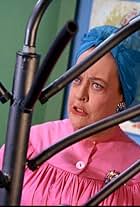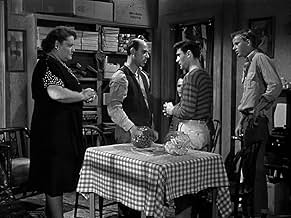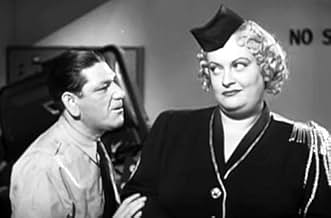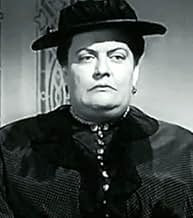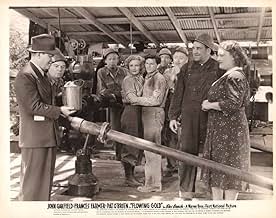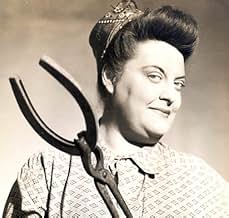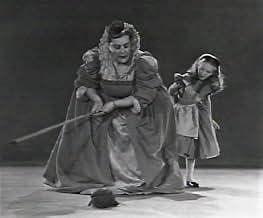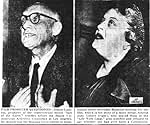Jody Gilbert(1916-1979)
- Actress
Jody grew up in Fort Worth, Texas, where she had her own musical show on local radio while she was still in high school. In her later teens, she toured the south in musical comedies, performed in summer stock across America and discovered that she would never get any good roles on the New York stage because of her strong Texas accent and ever-increasing size. By the time she was 20, she was finished with theatre. Broadway didn't want her, but it turned out that Hollywood did.
"There's one girl in Hollywood who worries neither over her weight nor waistline," wrote the gossip columnist May Mann in 1940, a few years after Jody arrived on the west coast. "She is Jody Gilbert, who eats heartily, takes only enough exercise to get her where she's going and does all right in the movies. Still in her early 20s, she already weighs an imposing 197 pounds and hopes to do even better. 'I'm a girl of parts,' she says, 'and the more parts the merrier' ... 'Why,' she asks chuckling, 'should I worry over my avoirdupois? It's done all right for me so far. If I lost any one of these chins I might be just another actress. As it is, I'm a person of some weight around here.'"
Sure enough, her avoirdupois did just fine for her, bringing her close to 100 roles in movies throughout the 1940s, ranging mostly from comic fat-girl parts with one line to comic fat-girl bit parts with no lines, like her role in Ninotchka (1939), in which she appears for a few seconds as Greta Garbo's roommate, who comes home to their cramped apartment and gets into her bed in the middle of a party.
Then, in 1948, she landed the role of Rosa, "the spectacularly fat and unattractive daughter of Pasquale", a supporting character on the radio program, Life With Luigi. The show was popular enough to make the jump to television, where it ran for a couple of seasons. However, both the radio show and the television show came to an end in 1953, the year in which when an unsuccessful writer called Harvey Narcisenfield identified Jody to the House Committee Un-American Activities (HUAC) as having been a member of the Communist party.
It was the height of the blacklist. Dozens of well-known actors, directors and producers had seen their careers destroyed following an appearance before the committee, regardless of whether any pro-Communist activity could be proved, so Jody would have been quite aware of what was almost certain to happen to her -- a small-time comedy actress -- when she received the subpoena requiring her to testify. And perhaps that's why she decided to make a mockery of the proceedings.
The committee's official report records that, just after lunch on 26 May, 1953, Jody sat down at the witness table. She was accompanied by two lawyers, but, as she pointed out with a self-deprecating reference to her considerable size, there was room for only one of them to sit beside her.
Frank Tavenner, the HUAC counsel, started off by asking Jody to give the committee a general description of her career.
"My first appearance, or my first movie, or my first radio show or my first television show?" asked Jody, innocently.
"What the record of your profession has been. If you were entitled to screen credits and received them in moving pictures or in radio, or any other matter," replied Tavenner, his emphasis on credits revealing that he had no idea of the insignificance of Jody's output before Life With Luigi. She'd had only a handful of screen credits, and they'd all been within the past few years.
Jody explained: "I was a little bit surprised myself, when I sat down to count up the score the other night, because I didn't realize that I had such a fine career, because I was such an unimportant person, you see; the person that the Hollywood trade papers refer to as a good -- "
"Will you answer the question, please!" Tavenner was already frustrated with Jody, and he didn't yet know that she planned to continue to pretend to answer his simple question for as long as he could bear it without giving him any helpful information whatsoever.
Jody rambled on, as if pleased to find herself unexpectedly in the company of an eager fan who wished to find out everything that there was to know about her wonderful life as a Hollywood extra, and Tavenner grew more and more annoyed. "I didn't ask you for a detailed statement," he pointed out with exasperation, "If you would just confine yourself to answering my questions."
Jody replied mischievously, "The Long Beach papers said that I would be a talkative witness, and I don't want to disprove anything that is printed in the press."
Tavenner persevered, asking Jody to tell the committee the names of some films for which she'd received screen credits, and Jody had to repeat that she rarely received screen credits, although she always received very good notices. "All right, then," said Tavenner, "I will change the question and ask you what were some of the major pictures in which you took part?"
Jody explained that that was really a matter of semantics -- who can say what makes a picture truly major, after all?
The committee had been sitting for 10 minutes already, and the counsel hadn't yet got past his first introductory question. A further 10 minutes later, while appearing to try honestly to answer all of Tavenner's questions as helpfully as possible, Jody had somehow conceded only that she had first appeared on stage when she was four, but not what year that was, and that she lived on North Bronson Avenue in Hollywood.
Tavenner tried to get the questioning back on course by informing Jody that she had been mentioned in testimony that they had received, whereupon Jody asked if she would be allowed to confer with her counsel for about two minutes -- she acknowledged that that might cause an awkward pause, saying sympathetically, "Nobody is more aware of dead air than I am."
Tavenner exclaimed, "I am willing for you to consult with counsel, of course, but I haven't asked you a question yet!"
Jody had to turn around and ask the audience in the public gallery to be quiet. Evidently, she couldn't hear Tavenner over their laughter.
Jody continued to play to the crowd until the committee chairman reprimanded her, saying, "This is a serious matter." At that, Jody dropped her clown routine for the first time in the meeting. "It certainly is," she replied, "I lost my job."
Tavenner seized his chance and pressed on: "I say you have been identified by Mr Harvey Narcisenfeld as having been a member of the Communist party, and I want to ask you about that. Have you ever been a member of the Communist party?"
"Do you really expect me to answer that?" asked Jody.
"Yes, Miss Gilbert, please."
If Tavenner expected the meeting to proceed according to the by-now well-established script whereby an actor would avoid answering the question by simply pleading the fifth amendment before being dismissed in disgrace, he was to be disappointed.
Yes, Jody pleaded the fifth - but it was the fifth commandment, not the fifth amendment. "Honor thy father and mother that thy days may be prolonged in the land which the Lord thy God has given thee," Jody quoted, before explaining: "I choose to interpret that to mean forefathers." She didn't want to dishonor her forefathers by doing anything other than protecting the rights that they had given her, which meant that she could do no other than decline to answer Tavenner's impertinent question.
She tried to explain her reasoning further, but Tavenner had had enough, and kept asking, "Do you decline to answer the question?" and "Do you rely on the fifth amendment?"
"I actually rely on the constitution of the United States and the ten commandments," Jody retorted. "I am aware that the fifth amendment was written for the protection of the innocent, and I rely on the fifth amendment." Then, just before the committee threw her out, she managed to squeeze in one more fat joke: "I am not hiding behind the fifth amendment" -- an impossibility, given her size -- "I am standing right in front of it!"
The committee refused to allow her to make a final statement or ask a question, and, as she left the room, she pledged to do so elsewhere.
She might have done, but the press didn't report it. The newspapers that mentioned her appearance before the committee portrayed it as a confusing farce, rather than as the corrosive indictment of a vicious and unfair witch hunt that Jody was presumably aiming for. The Billings Gazette's headline is typical of the tone of the coverage: Actress Invokes Many Amendments!
It was an astonishingly brave performance, and it might even have been the first time that anyone had ever dared to treat the committee with the contempt that most of the movie-making community privately agreed it deserved, but, for Jody, the outcome was that she didn't have a day's work in the next 12 years. It was 1965 before she started to get even the smallest roles on television shows, and 1969 before she appeared in a film again, when she was an extra in Butch Cassidy and the Sundance Kid.
A decade later, during which time she averaged only one television appearance a year, Jody was in a car accident. She suffered massive injuries, which killed her a few months later. She was 63, the year was 1979, and it really didn't matter whether she'd been a Communist or not.
"There's one girl in Hollywood who worries neither over her weight nor waistline," wrote the gossip columnist May Mann in 1940, a few years after Jody arrived on the west coast. "She is Jody Gilbert, who eats heartily, takes only enough exercise to get her where she's going and does all right in the movies. Still in her early 20s, she already weighs an imposing 197 pounds and hopes to do even better. 'I'm a girl of parts,' she says, 'and the more parts the merrier' ... 'Why,' she asks chuckling, 'should I worry over my avoirdupois? It's done all right for me so far. If I lost any one of these chins I might be just another actress. As it is, I'm a person of some weight around here.'"
Sure enough, her avoirdupois did just fine for her, bringing her close to 100 roles in movies throughout the 1940s, ranging mostly from comic fat-girl parts with one line to comic fat-girl bit parts with no lines, like her role in Ninotchka (1939), in which she appears for a few seconds as Greta Garbo's roommate, who comes home to their cramped apartment and gets into her bed in the middle of a party.
Then, in 1948, she landed the role of Rosa, "the spectacularly fat and unattractive daughter of Pasquale", a supporting character on the radio program, Life With Luigi. The show was popular enough to make the jump to television, where it ran for a couple of seasons. However, both the radio show and the television show came to an end in 1953, the year in which when an unsuccessful writer called Harvey Narcisenfield identified Jody to the House Committee Un-American Activities (HUAC) as having been a member of the Communist party.
It was the height of the blacklist. Dozens of well-known actors, directors and producers had seen their careers destroyed following an appearance before the committee, regardless of whether any pro-Communist activity could be proved, so Jody would have been quite aware of what was almost certain to happen to her -- a small-time comedy actress -- when she received the subpoena requiring her to testify. And perhaps that's why she decided to make a mockery of the proceedings.
The committee's official report records that, just after lunch on 26 May, 1953, Jody sat down at the witness table. She was accompanied by two lawyers, but, as she pointed out with a self-deprecating reference to her considerable size, there was room for only one of them to sit beside her.
Frank Tavenner, the HUAC counsel, started off by asking Jody to give the committee a general description of her career.
"My first appearance, or my first movie, or my first radio show or my first television show?" asked Jody, innocently.
"What the record of your profession has been. If you were entitled to screen credits and received them in moving pictures or in radio, or any other matter," replied Tavenner, his emphasis on credits revealing that he had no idea of the insignificance of Jody's output before Life With Luigi. She'd had only a handful of screen credits, and they'd all been within the past few years.
Jody explained: "I was a little bit surprised myself, when I sat down to count up the score the other night, because I didn't realize that I had such a fine career, because I was such an unimportant person, you see; the person that the Hollywood trade papers refer to as a good -- "
"Will you answer the question, please!" Tavenner was already frustrated with Jody, and he didn't yet know that she planned to continue to pretend to answer his simple question for as long as he could bear it without giving him any helpful information whatsoever.
Jody rambled on, as if pleased to find herself unexpectedly in the company of an eager fan who wished to find out everything that there was to know about her wonderful life as a Hollywood extra, and Tavenner grew more and more annoyed. "I didn't ask you for a detailed statement," he pointed out with exasperation, "If you would just confine yourself to answering my questions."
Jody replied mischievously, "The Long Beach papers said that I would be a talkative witness, and I don't want to disprove anything that is printed in the press."
Tavenner persevered, asking Jody to tell the committee the names of some films for which she'd received screen credits, and Jody had to repeat that she rarely received screen credits, although she always received very good notices. "All right, then," said Tavenner, "I will change the question and ask you what were some of the major pictures in which you took part?"
Jody explained that that was really a matter of semantics -- who can say what makes a picture truly major, after all?
The committee had been sitting for 10 minutes already, and the counsel hadn't yet got past his first introductory question. A further 10 minutes later, while appearing to try honestly to answer all of Tavenner's questions as helpfully as possible, Jody had somehow conceded only that she had first appeared on stage when she was four, but not what year that was, and that she lived on North Bronson Avenue in Hollywood.
Tavenner tried to get the questioning back on course by informing Jody that she had been mentioned in testimony that they had received, whereupon Jody asked if she would be allowed to confer with her counsel for about two minutes -- she acknowledged that that might cause an awkward pause, saying sympathetically, "Nobody is more aware of dead air than I am."
Tavenner exclaimed, "I am willing for you to consult with counsel, of course, but I haven't asked you a question yet!"
Jody had to turn around and ask the audience in the public gallery to be quiet. Evidently, she couldn't hear Tavenner over their laughter.
Jody continued to play to the crowd until the committee chairman reprimanded her, saying, "This is a serious matter." At that, Jody dropped her clown routine for the first time in the meeting. "It certainly is," she replied, "I lost my job."
Tavenner seized his chance and pressed on: "I say you have been identified by Mr Harvey Narcisenfeld as having been a member of the Communist party, and I want to ask you about that. Have you ever been a member of the Communist party?"
"Do you really expect me to answer that?" asked Jody.
"Yes, Miss Gilbert, please."
If Tavenner expected the meeting to proceed according to the by-now well-established script whereby an actor would avoid answering the question by simply pleading the fifth amendment before being dismissed in disgrace, he was to be disappointed.
Yes, Jody pleaded the fifth - but it was the fifth commandment, not the fifth amendment. "Honor thy father and mother that thy days may be prolonged in the land which the Lord thy God has given thee," Jody quoted, before explaining: "I choose to interpret that to mean forefathers." She didn't want to dishonor her forefathers by doing anything other than protecting the rights that they had given her, which meant that she could do no other than decline to answer Tavenner's impertinent question.
She tried to explain her reasoning further, but Tavenner had had enough, and kept asking, "Do you decline to answer the question?" and "Do you rely on the fifth amendment?"
"I actually rely on the constitution of the United States and the ten commandments," Jody retorted. "I am aware that the fifth amendment was written for the protection of the innocent, and I rely on the fifth amendment." Then, just before the committee threw her out, she managed to squeeze in one more fat joke: "I am not hiding behind the fifth amendment" -- an impossibility, given her size -- "I am standing right in front of it!"
The committee refused to allow her to make a final statement or ask a question, and, as she left the room, she pledged to do so elsewhere.
She might have done, but the press didn't report it. The newspapers that mentioned her appearance before the committee portrayed it as a confusing farce, rather than as the corrosive indictment of a vicious and unfair witch hunt that Jody was presumably aiming for. The Billings Gazette's headline is typical of the tone of the coverage: Actress Invokes Many Amendments!
It was an astonishingly brave performance, and it might even have been the first time that anyone had ever dared to treat the committee with the contempt that most of the movie-making community privately agreed it deserved, but, for Jody, the outcome was that she didn't have a day's work in the next 12 years. It was 1965 before she started to get even the smallest roles on television shows, and 1969 before she appeared in a film again, when she was an extra in Butch Cassidy and the Sundance Kid.
A decade later, during which time she averaged only one television appearance a year, Jody was in a car accident. She suffered massive injuries, which killed her a few months later. She was 63, the year was 1979, and it really didn't matter whether she'd been a Communist or not.
